Francis Brake was having a bad hair day. You know it’s bad when you get heckled while walking around a night market.
“Your haircut sucks,” someone told him. “You need a new one.”
The man with the blunt words was Louis Lee, (李俊生) 46, co-owner of Slick Barbershop in Taichung. He then offered Brake a free haircut. That was three years ago. Brake, a 32 year old Canadian, now lays down NT$800 every month for the latest hair trend: closely trimmed sides and long on the top. The 45-minute-long haircut includes a straight razor shave above the ears.
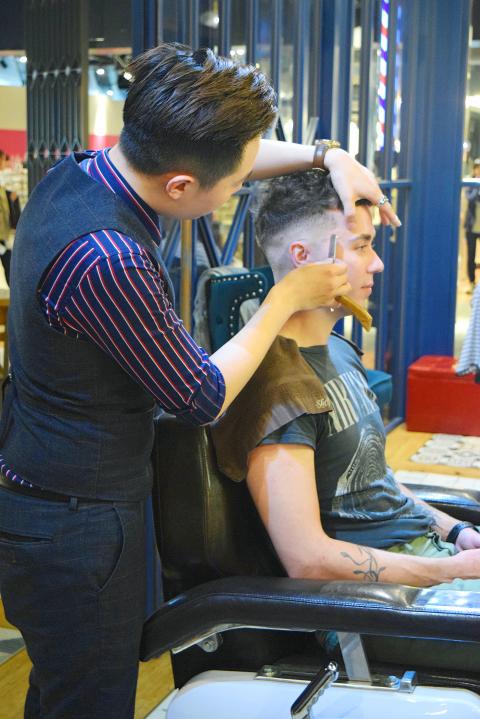
Photo: John Evans
“I didn’t know about these kinds of places before,” Brake said after getting a trim on a recent Saturday afternoon. “I know I’m going to get a good haircut here.”
While typical barbers might charge a few hundred New Taiwan dollars — with ones in the countryside costing even less — more millennials with disposable income have decided to go high end when it comes to their hair needs.
Of the thousands of barbershops in Taiwan, a handful have sprouted up in recent years that specialize in high-end haircuts tailored for men. It’s a throwback to a bygone era.
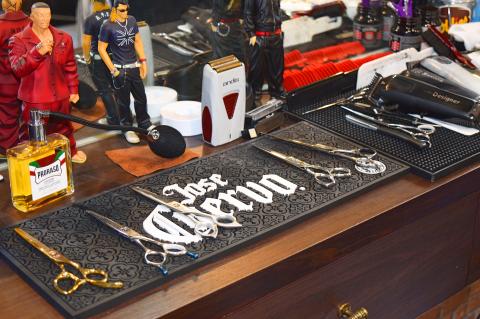
Photo: John Evans
There are roughly 30 such barbershops in Taiwan, according to the Asia Barber Association, an industry trade group based in Guangzhou, China. Lee, who serves as president of the association’s Taiwan region, expects this number to rise in the future.
MACULINITY AND BELONGING
While husbands might go to the same uni-sex hair salon as their wives, high-end barbershops are hoping to lure them away, playing up the feeling of masculinity and belonging. It’s a recent trend — going along with the growth in businesses specializing in men’s accessories, whether it’s custom made shoes or tailors with a gentlemen’s club-like atmosphere.
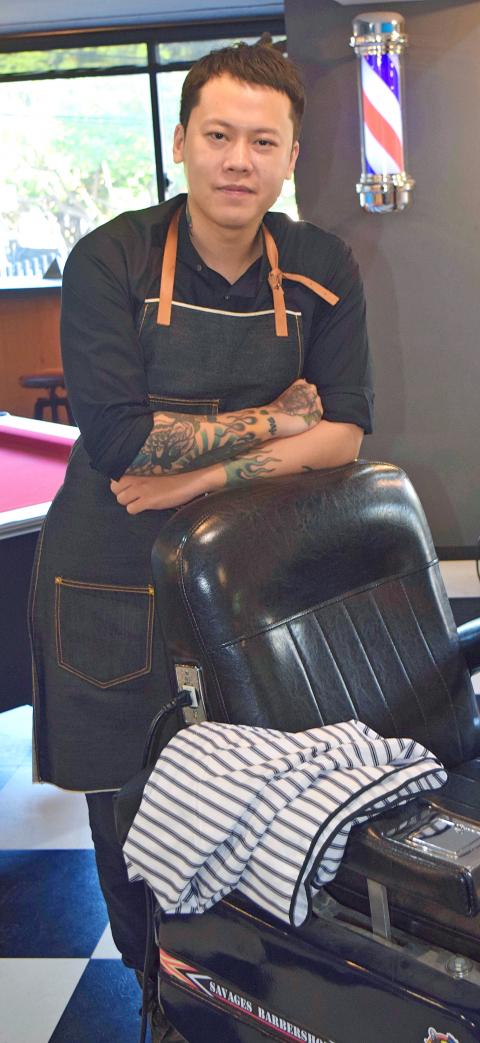
Photo: John Evans
“It’s something that men should experience,” Lee said. Slick, of which there are five in Taichung, recreates a feeling of a period more fitting of the 1940s and 1950s.
Adding to this mood is a movie poster of The Godfather, with a tuxedoed Marlin Brando looking over one of the barbershops.
Or in modern terms, Lee wants to recreate the feeling of the Kingsman movies, where finely-dressed spies outwit villains.
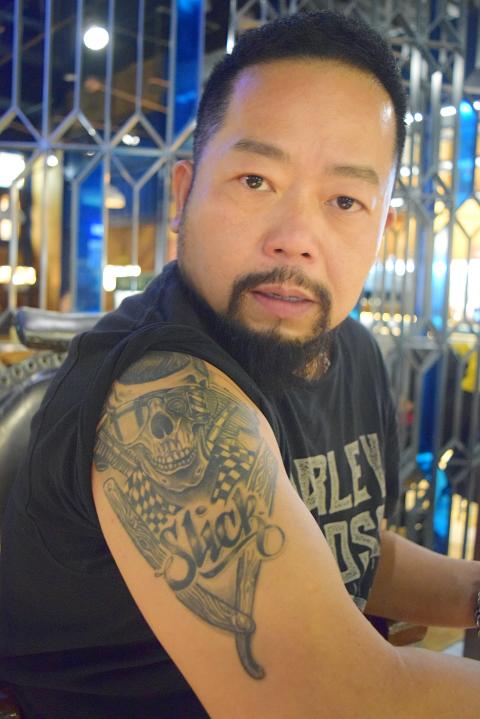
Photo: John Evans
Playing up this sense of coolness, whiskey, beer and coffee are offered complimentary.
“Getting a good haircut is kind of like a ceremony,” Lee said. “The goal is to get customers to relax and enjoy themselves.”
While Lee has the model down now, making it a business opportunity was by chance.
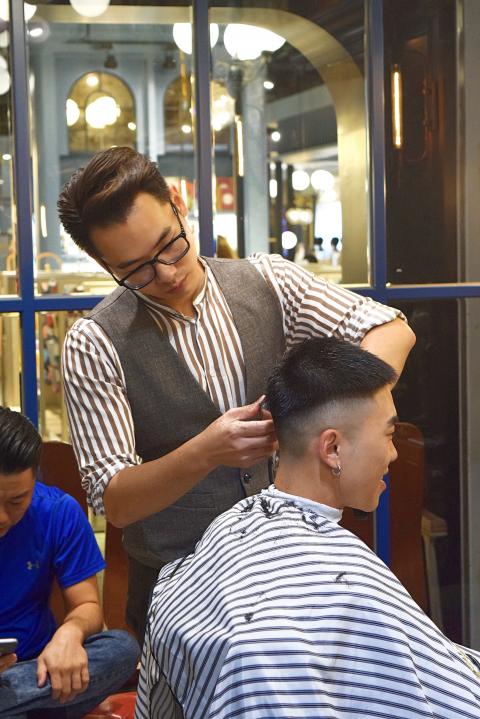
Photo: John Evans
Lee and his friend opened up a small shop in a Taichung night market three years ago that featured one barber’s chair and two Harley-Davidson motorcycles. The barber’s chair was so old that it came with an attached ashtray. Admittedly, it was a place to look cool.
“It was like making a man cave,” Lee said.
But unexpectedly, customers came — and kept returning. What was once just for fun, became a real business. Now business is booming, and Lee imagines opening more branches of Slick in the Taipei area.
At 200 haircuts per month, barber Hong Yu-yao (洪渝耀) is in demand. The 24 year old, clad in a tie, vest and patent leather shoes, is often booked a week in advance. Businessmen and other white-collar workers make up the bulk of his customers.
CUT AND A CHAT
While the cuts are often similar — short on the sides, floppy on the top — the topics of conversation vary with each customer. Aside from movies and sports, Hong chats about girlfriends, wives and love, doling out advice when needed.
“They’re not just my customers. They’re my friends,” said Hong, who is studying hair design at a local university.
Across town at Savages Barbershop it’s hard to miss the giant barber sign with ubiquitous red, blue and white stripes. The Taichung barbershop’s pool table and impressive collection of alcoholic drinks gives the place a social club-like atmosphere.
“It’s not just a barbershop,” said Harry Fu (傅華偉), 32, who co-owns three branches of Savages in Central Taiwan. “It’s a place where men can go to relax and be themselves.”
The music is ‘90s hip-hop and the walls are decorated with photos, including those of scantily clad women.
On the television one recent afternoon, the adult comedy Ted was being shown.
“No romantic comedies here,” Fu said.
While the style of Savages is loud and rebellious, it’s still all about the haircuts.
With eight retro-looking barber chairs, the barbershop specializes in the popular pompadour style. A shave and a haircut goes for NT$1,000. Fu said he drew inspiration for the business from traditional Western barbershops. As for Taiwan’s past history with barbershops, many were known less for their haircuts and more for places to meet women.
“I asked myself why Taiwan didn’t have any real barbershops,” Fu said. “And that’s what we wanted to make, a real barbershop.”

Growing up in a rural, religious community in western Canada, Kyle McCarthy loved hockey, but once he came out at 19, he quit, convinced being openly gay and an active player was untenable. So the 32-year-old says he is “very surprised” by the runaway success of Heated Rivalry, a Canadian-made series about the romance between two closeted gay players in a sport that has historically made gay men feel unwelcome. Ben Baby, the 43-year-old commissioner of the Toronto Gay Hockey Association (TGHA), calls the success of the show — which has catapulted its young lead actors to stardom -- “shocking,” and says

The 2018 nine-in-one local elections were a wild ride that no one saw coming. Entering that year, the Chinese Nationalist Party (KMT) was demoralized and in disarray — and fearing an existential crisis. By the end of the year, the party was riding high and swept most of the country in a landslide, including toppling the Democratic Progressive Party (DPP) in their Kaohsiung stronghold. Could something like that happen again on the DPP side in this year’s nine-in-one elections? The short answer is not exactly; the conditions were very specific. However, it does illustrate how swiftly every assumption early in an

Inside an ordinary-looking townhouse on a narrow road in central Kaohsiung, Tsai A-li (蔡阿李) raised her three children alone for 15 years. As far as the children knew, their father was away working in the US. They were kept in the dark for as long as possible by their mother, for the truth was perhaps too sad and unjust for their young minds to bear. The family home of White Terror victim Ko Chi-hua (柯旗化) is now open to the public. Admission is free and it is just a short walk from the Kaohsiung train station. Walk two blocks south along Jhongshan

Francis William White, an Englishman who late in the 1860s served as Commissioner of the Imperial Customs Service in Tainan, published the tale of a jaunt he took one winter in 1868: A visit to the interior of south Formosa (1870). White’s journey took him into the mountains, where he mused on the difficult terrain and the ease with which his little group could be ambushed in the crags and dense vegetation. At one point he stays at the house of a local near a stream on the border of indigenous territory: “Their matchlocks, which were kept in excellent order,